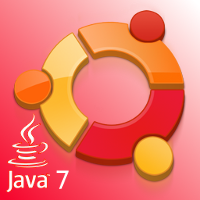Install JDK 7 on Ubuntu

Install JDK 7 on Ubuntu
Problem 1: Java version 7 is not available from the official Ubuntu repositories. You don’t see it neither via
"Ubuntu Software Center" nor via Synaptic Package Manager.What to do: Download JDK 7 binaries from the official Java site.
Problem 2: You are Debian/Ubuntu user and don’t see applicable
.deb package.What to do: Again, download JDK 7 self-extract binaries from the official Java site, install and configure it manually.
Step by step instructions to install and manual configure JDK 7 on the Ubuntu 10.04 LTS (the Lucid Lynx) desktop follow:
- For my X64 Ubuntu 10.04 LTS Desktop installation I downloaded Linux X64 self-extracting JDK file from Linux X64 Platform section.
- Using
chmod 755 ./jdk-7-ea-bin-b118-linux-x64-11_nov_2010.bincommand I made file executable.
- Execute it. JDK 7 package is extracted into
./jdk1.7.0 directory.- Move JDK 7 directory to place where it should be. Right, to the
/usr/lib/jvm/jdk1.7.0 directory. Use this command for thatsudo mv ./jdk1.7.0/ /usr/lib/jvm/jdk1.7.0- Execute this command
sudo update-alternatives --config javato know under what number you will config you new Java installation. You will get output as:
$sudo update-alternatives –config java
There are 2 choices for the alternative java (providing /usr/bin/java). Selection Path Priority Status
————————————————————
* 0 /usr/lib/jvm/java-6-openjdk/jre/bin/java 1061 auto mode
1 /usr/lib/jvm/java-6-openjdk/jre/bin/java 1061 manual mode
2 /usr/lib/jvm/java-6-sun/jre/bin/java 63 manual mode
Press enter to keep the current choice[*], or type selection number:
Remember the last number and press enter to exit this utility.There are 2 choices for the alternative java (providing /usr/bin/java). Selection Path Priority Status
————————————————————
* 0 /usr/lib/jvm/java-6-openjdk/jre/bin/java 1061 auto mode
1 /usr/lib/jvm/java-6-openjdk/jre/bin/java 1061 manual mode
2 /usr/lib/jvm/java-6-sun/jre/bin/java 63 manual mode
Press enter to keep the current choice[*], or type selection number:
- Execute this command
sudo update-alternatives --install /usr/bin/java java /usr/lib/jvm/jdk1.7.0/jre/bin/java 3to add your new JDK 7 installation into alternatives list. I put 3 there as 2 was last number for my configuration. You should use your own number from the previous step increased by 1.
- Execute this command
sudo update-alternatives --config java.You will see output similar one below:
$sudo update-alternatives –config java
There are 3 choices for the alternative java (providing /usr/bin/java). Selection Path Priority Status
————————————————————
* 0 /usr/lib/jvm/java-6-openjdk/jre/bin/java 1061 auto mode
1 /usr/lib/jvm/java-6-openjdk/jre/bin/java 1061 manual mode
2 /usr/lib/jvm/java-6-sun/jre/bin/java 63 manual mode
3 /usr/lib/jvm/jdk1.7.0/jre/bin/java 3 manual mode
Press enter to keep the current choice[*], or type selection number: 3
update-alternatives: using /usr/lib/jvm/jdk1.7.0/jre/bin/java to provide /usr/bin/java (java) in manual mode.
The job is done. You are fineshed. Just check version of you new JDK 7 installation typing this command There are 3 choices for the alternative java (providing /usr/bin/java). Selection Path Priority Status
————————————————————
* 0 /usr/lib/jvm/java-6-openjdk/jre/bin/java 1061 auto mode
1 /usr/lib/jvm/java-6-openjdk/jre/bin/java 1061 manual mode
2 /usr/lib/jvm/java-6-sun/jre/bin/java 63 manual mode
3 /usr/lib/jvm/jdk1.7.0/jre/bin/java 3 manual mode
Press enter to keep the current choice[*], or type selection number: 3
update-alternatives: using /usr/lib/jvm/jdk1.7.0/jre/bin/java to provide /usr/bin/java (java) in manual mode.
java -version. You should see something like this: ~$ java -version
java version “1.7.0-ea”
Java(TM) SE Runtime Environment (build 1.7.0-ea-b118)
Java HotSpot(TM) 64-Bit Server VM (build 20.0-b02, mixed mode)
java version “1.7.0-ea”
Java(TM) SE Runtime Environment (build 1.7.0-ea-b118)
Java HotSpot(TM) 64-Bit Server VM (build 20.0-b02, mixed mode)
Thanks for your instructions.
ReplyDeleteI am only wondering:
What are the consequences for Tomcat? Do I need Tomcat7 also and consequences for Ant?
I have some ERP-applications installed (i.e. Opentaps). All Java6. Consequences?
Greetings
Frans
f.van.der.star@gmail.com
i got
ReplyDeleteupdate-alternatives: error: no alternatives for java.
when i execute
sudo update-alternatives --config java.
Awesome!!!!.
ReplyDeleteCool!! Finally got it to work, thanks for this lovely tutorial
ReplyDeletetest
ReplyDeleteWhat about the many other commands in jdk such as jar, javadoc, etc?
ReplyDelete